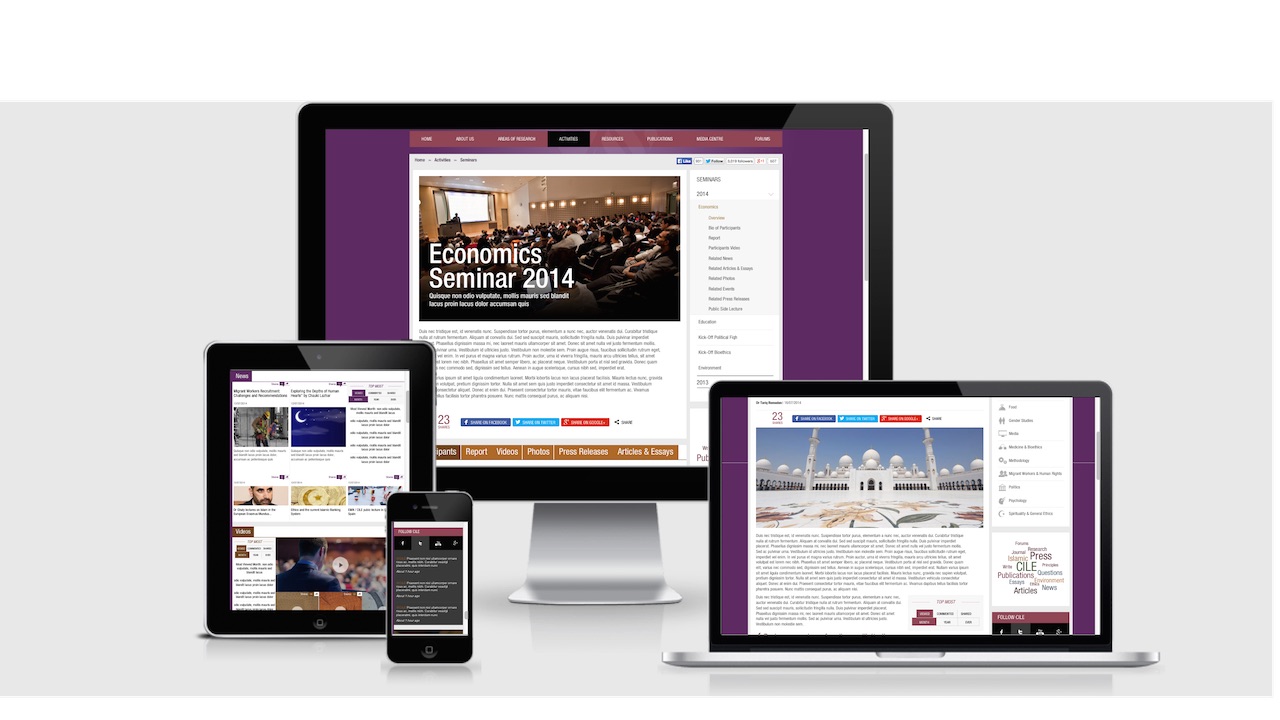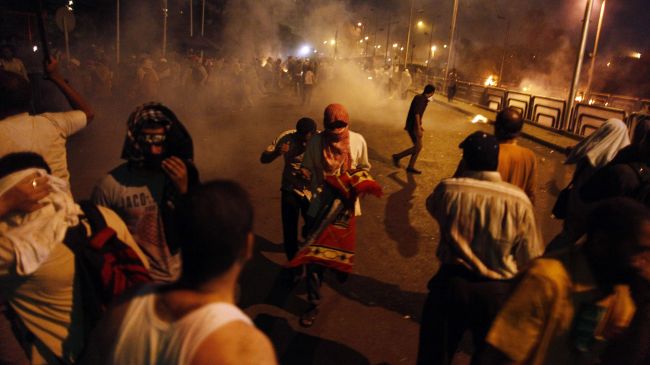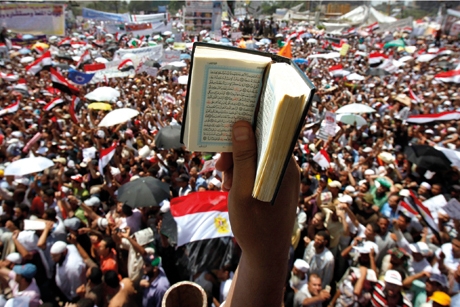Western Muslims are here to stay – God willing, of course. It is obvious that we are being studied, scrutinized and we have become a cause for suspicion. The coming years will not be easy nor calm.
With more than 17 million Muslims in Western Europe who are established, visible, and either integrated or soon to be citizens, we can expect tumultuous years ahead. Needless to say, it is more expedient to build a vision for the future – what do we want and how do we achieve it?
Acting without an objective is to agitate. Acting with an end in sight is to build and mould.
Before defining our goals and laying out the steps, let us examine the principles that underlie our approach. We need to be clear on the foundations of our commitment – what motivates our discourse and what are our limits?
These are basic questions that deserve clear responses; our answers will determine the shape of our vision and, for our counterparts, allow them to enter our world by providing the tools to better understand us.
Five Pillars of an Enlightened Presence
Our ethic is founded on five pillars that is the basis of our existence and commitment. Each pillar, varying in importance, is necessary in itself and dependent on the next. They inform us of who we are and what our aspirations and responsibilities are. They are the guiding light that enhances our vision rather than having our whims build it from scratch. Let us examine each pillar, one at a time.
1 – Faith: Fact and Testimony
How can we be Muslims in an age when secularism tightens its grip on Europe and when the mysterious Universe becomes less “enchanting”?
We need to begin at this point – that which underlies our commitment is a determined desire to remain Muslim in Europe. To be a Muslim means to be mindful of the Creator, knowing that we are in His presence, serving Him and finding ways to get closer to Him, intimately, spiritually and with all the energy in our hearts.
We want to live here, but not at the cost of loosing our faith. We can’t, and we won’t, be “Muslims without Islam.”
Islam is a living faith. It requires nourishment to grow. Sometimes it regresses and requires conscience, protection, refinement, discipline and a spiritual community. Our desire is to remain faithful to God and to ourselves. Only then will we attain inner peace. It is at the core of this commitment that we become true witnesses of Peace.
The mosques we build, the organizations we found, the education we provide, the lectures, the courses, the meetings…what is the purpose of all these? It is to maintain the connection with the Almighty with our heart, conscience, body and mind. Because beyond this life is the Hereafter and beyond our perceived freedom, there is His Will. Beyond our love is His love.
Such is the vastness of the Light we talk about so much. It brightens our perception of the world and it guides us unerringly. We seek to pass it down to our children and it is this Light that, in the heart of Europe, we testify to: He is One God, and to Him we are true, to the best of our abilities, but increasing in strength each day, the same way we are true to ourselves, our families and all those whom we love. Our sincerity is our pact with God that only He knows and accepts.
2 – Ethic of Responsibility
The Russian author, Dostoyevsky, once wrote: “If God doesn’t exist, everything is permissible.” But God does exist and not everything is allowed. In this regard, the message of Islam is clear – for humans to think of God means to think of personal responsibility, which is the one and only way to earn His love.
When the means of success become ends themselves, whether it is performance, personal gain, power, fame, then sincere Muslims side with the voices of resistance.
Not everything is allowed on the way to secure wealth, power and pleasure. Rather, being with God is to promote and defend values – it is a kind gesture, and it is to assess the means that justify the ends. Let your conscience guide you in all affairs.
The ethic of responsibility, which lies at the heart of Muslim spirituality, affirms that there is good and evil and that one must make a choice between them. It is, therefore, unequivocal commitment and personal effort that underlie this ethic.
This is the tribulation of a life that refuses self-victimization and endless whining. For instance, in Europe, like elsewhere, life is hard and choices are stark, but our humanity is at stake. We have what others don’t and others may have what we lack. Everyone is tried individually and God is always just.
We inevitably encounter our own weaknesses, face temptations, all in a world that cringes at that the mere mention of “morality.” Our references, in this respect, confirm what Baudelaire’s aesthetic intuition stated: “The devil’s greatest trick is to make you believe he doesn’t exist.” We should learn this lesson well.
3 – Exacting Involvement
We are not born as spectators, whether we are here or elsewhere. Wherever they are, “those who believe and do good” are active. To act is first to understand the environment in which we live, assess the balances, determine the priorities and measure the constraints. Between the fear of getting lost and the imperative of reform lies our personal path to concretely “promote good and resist evil and injustice.”
It is not only about “integrating”, being “accepted”, “appreciated”, or even “liked” in Europe. The first step in affirming our identity with regard to our environment is to be simply respected. No more and, definitely, no less. Of course, we must also hope for and promote sincere recognition, friendship and mutual affection.
This is the first requirement and it determines the rest. We need to be respected, although in reality we are not and that is probably because we do not know how to demand respect or, even worse, because we are not worthy of it. This is exactly where we need to get involved – to be recognized for whom we are – citizens, Muslims, sure about ourselves and aware of our rights.
This prerequisite enables us to strengthen our involvement in social, educational, economic, political, academic and cultural spheres. Our presence and contribution can only be done as active citizens, in the light of our ethical consciousness – in our daily lives fostering solidarity with men and women of goodwill, reforming our present state, building our future and revisiting the past and our collective memory. This is what our involvement entails and it is no small task.
4 – Inalienable Independence
We have neither Church nor Pope, neither hierarchy nor castes. Our principles of organization, in accordance with the rules and conditions of consultation (shura), are established by considering the current context and the intellectual capacities of each one.
This compels the entire Muslim community to be dynamic, creative, always in search of what is best, true and efficient. This is where the principle of consultation is a great advantage for Muslims seeking earnest faith, action and reform. Consultation is the road to progress and it is aligned with the plan of the Guide (al Hadi).
By the same token, in a state of intellectual stagnation, communal lethargy and spiritual depravation, this asset becomes an unpleasant drawback. Instead of building, it sows reactionary division, sectarianism and spiteful power struggles.
How do we safeguard this edge from turning into a vice, and allowing diverging, legitimate opinions, diversity and consultation to become strengths rather than a pit of grudges and debility? How do we come to terms with the fact that it is sometimes harder to hold dialogue with another Muslim than with individuals of another religion?
Dependence on God and on truth – this is the principle that guides us in our path. We must question our intentions and sincerely determine the motive behind our positions. To do this, we need to cut off all spineless allegiances to all governments (whether here or abroad), decline all “donations” with strings attached, refuse to adhere blindly to a school of thought, eschew sectarianism, refuse to be subjected to prejudice and rumours.
Just like the shahada begins by negating every other dependence save God, the same way our conscience needs to refuse any other dependence in order to better uphold justice. This means surrendering to truth, respecting opinions, accepting to live in diversity, consulting and discussing with one another in order to make conscientious choices, driven by an inalienable independence, and directing our hope towards the Almighty.
5 – Pro-Justice
“God commands justice.” If we were to define Islam in only a few words it would be: recognize the Only One (al Ahad) and establish justice. Our faith, our ethic, our involvement and our independence have the ultimate goal of establishing justice wherever we are present.
Be a witness of justice for all human beings, women and men, for all religions, for all spiritualities, for all humanisms, for each and everyone. We affirm our faith to all of humanity in this manner. Has not the Prophet of Islam, peace and blessings be upon him, warned us to: “Beware of the supplication of the oppressed, even if he is a disbeliever, for there is no veil (separating his supplication from God)”?
It cannot be any clearer.
Our vision is founded on promoting justice through words, actions and prayers, anytime and anywhere. We befriend anyone who is committed to the rightful treatment of children, women, men, the elderly, prisoners and peoples, whoever they may be. We befriend anyone committed to just treatment of Creation, animals, cattle, plants and trees. We must generously contribute in all of these areas, for our identity is rooted in the qualities of action and resistance. Having the courage to condemn the condemnable, to laud the laudable, to get involved in just initiatives, whether Muslim or not, justice is justice and we are its devout defenders.
These are the five pillars of an enlightened and wise Muslim Presence. Five gates from which to enter into communication with our Islamic universe and to understand who we are and what we want. These are the principles and the framework. They need to be studied and discussed; we need to be sensitive about them, and, as we advance, begin to elaborate our vision of the future.
Of course, the hard part is yet to come. We need time and the more critical minds, the better. We have heard this often, but “God loves those who persevere.” Basically, it is above all a matter of the heart, for it is His love that we seek.










Thank you for the englightening piece!
« God Commands justice », « we must not be spectators ». These two statements remind me of what is going on in Afghanistan with the muslim convert to christianism who is held and would be executed lest he reverts to Islam. Who are we to play God? Why aren’t we standing against such deeds? It pains so to see muslim brothers going to such extents in the name of Islam.
Fatma,
You are asking some real questions in the face of painful realities.
You call it « playing God » but isn’t this what your religion commands / instructs you to do with such people ?
At this web site you will find compilations from Islamic (your) sources on this subject :
http://www.answering-islam.org/Silas/apostasy.htm
Is it only because this incident makes for bad and embarassing publicity for you that you wish to dissociate yourself from the Afghan Muslim authorities who remain determined that Abdul Rahman must die ? Are you willing to dismiss them merely as ignorant fools ?
This happens all the time in nearly all the Muslim countries. If you are unaware of this you should make the effort to educate yourself and learn what serious problems are faced by people who declare they have become Christian in a Muslim country.
There is a famous song from the group called Eagles . It is called « Hotel California ». Do you know it ? There is a passage in the song which goes like this :
« Welcome to the Hotel California.
We are programmed to receive.
You can checkout any time you like,
But you can never leave! »
Islam is like the Hotel California.
« There is no compulsion in religion. Truth stands out from error » The afghans are misguided. Islam allows anyone to leave who is not convinced by th truth of its message. Rather it is the people who do not tolerate anyone leaving. Once again this is due to a lack of education and awareness amongst the muslims.
It’s good to see Frere Tariq has a grand plan to make you all comfortable in the West. (Is there anything else we can get you?). But somebody who wants to be a Christian gets the death penalty in a Muslim country — one of the countries you came from. Do you see something wrong with this picture?
The lyric to « Hotel California » is actually:
« Relax », said the sandman, « We are programmed to receive
« You can check out any time you like, but you can never leave »
You are right that we need to think things out and work on a vision for the future. The problem is that it is near to impossible to get people to work on something constructively together, as a muslimcommunity, but even as an ethnic community. I think you know the Moroccan community a little bit: it is loose sand. There are so many problems and the goal of working on a solid islamic vision seems so far away. There is no community, no ‘one muslim presence’; there are only individuals who do or do not manage to find their way in life.